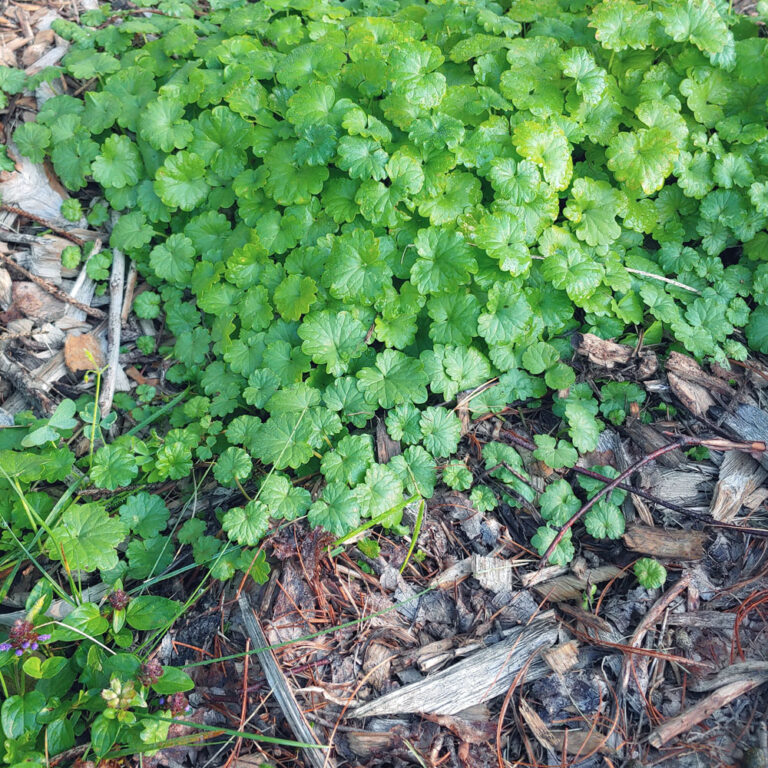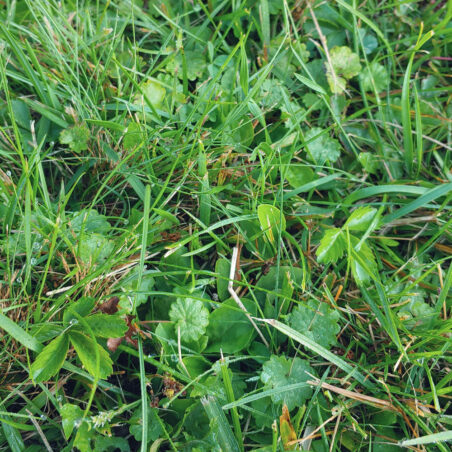Creeping Charlie Creeping You Out?

Creeping Charlie (Glechoma hederacea) has variations that are selected as excellent groundcovers (and may not be as invasive). You may have seen something close planted deliberately in a garden. Garden centers originally sold this selection as a carefree grower – “Gardener Beware, huh?!” This explains the source of many of our invasive plant species. Control Tips below can be applied to other alien invaders, too.
The trick for control is to choose your battleground. The “Creeping Charlie/ground ivy” spreads from bits of root as well as prolific seeds. (Birds distribute seed as do rabbits and voles.)
With regular pulling and barriers, it can be kept out of perennial garden beds but not without regular attention.
How do you get Creeping Charlie out of the lawn?

Creeping charlie (Glechoma hederacea), wild strawberry (Fragaria virginiana), and plantain (Plantago major) all mingle with grass plants in this lawn.
It’s a true battle to get out of the lawn. Raising the pH of the lawn soil can help. (Get a soil test kit or have soil tested). A pH of 6.5 helps grass thrive better and out-compete the ivy. Other steps to improve lawn vigor will help as well: aerating compacted soil, adding a thin layer of compost to the grass, overseeding that composted area and then fertilizing by mid-September.
We have a product from Bonide called Chickweed & Clover Weed Killer that is a combination of 2,4-D and plant oils (as in BurnOut II). It controls the creeping charlie (maybe Bittersweet?) but the chemicals can be strong. Grass is not affected. You have to decide if you can accept the petroleum -based chemicals. But if you are at a threshold where other plants cannot compete, careful application on this invasive is a justifiable action.
Learn more about timing your pest solutions.
I learned from a wetland protection expert, that to restore some areas, they had to use RoundUp (to get rid of purple loosestrife and phragmites) but did so in a very targeted way.
- They actually cut back the plants regularly through the growing season (preventing flowering & seed production)
- then in August when these perennial invasives start to go dormant, they cut the plant down to the ‘surface’ – water in their case but would apply to soil-surface
- Next they ‘painted’ the chemical on the exposed wound. In the process of going dormant, the plant’s vascular tissue is pulling nutrients to the roots.
In this, they effectively dose the plant and it draws the chemical to the roots as part of its natural process. They didn’t lose any effectiveness from rainfall or wind. No chemical spilled into the soil either where it can persist. The solution was to use RoudUp appropriately and sparingly. RoundUp is a broad spectrum herbicide and will kill grass as well as broad-leaf weeds. Additional chemicals in the mix could cause cancer.
AND ALWAYS FOLLOW THE DIRECTIONS ON ANY PEST SOLUTION.
Natural and organic does not necessarily mean safe. Please protect yourself, use only on plants as directed and in the method prescribed.
Here’s a link to a tip-sheet from University of Wisconsin about Creeping Charlie that reiterates some of what we’ve said.
http://hort.uwex.edu/articles/creeping-charlie
Lots of information, we know. Just think of this plant as something to keep you busy in the garden….
Spring Gardening Tips
The garden is waking up, and you're in charge! It's time to start planting, pruning, and preparing your flower beds.
Spring Articles